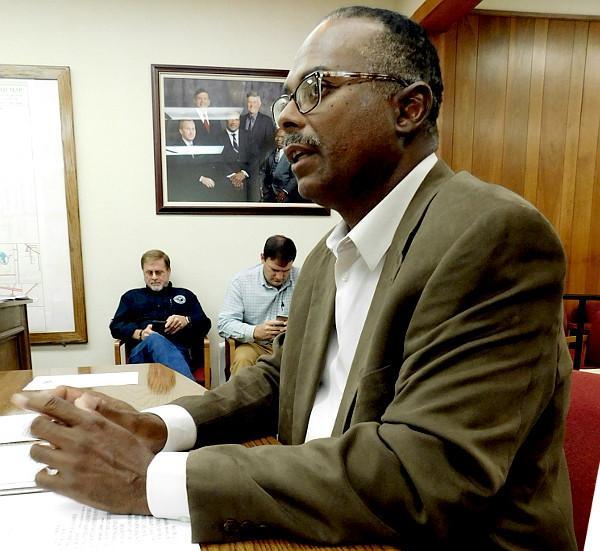
Photo by Sue Watson
Gary Anderson reports to the board of supervisors.
Board discusses housing taskforce
Gary Anderson, chairman of the new Marshall County Housing Taskforce, reported to the board of supervisors on its first meeting.
Those serving on the taskforce include Betty Byrd, Marshall County tax collector; Tracy Davidson, president of Citizens Bank; Juanita Dillard, Marshall County tax assessor; Steve Gresham, president, Bank of Holly Springs; Ken Jones, zoning director; Charles King, retired banker, Hubert McKenzie, retired fireman; and Chuck Thomas, chancery clerk.
He said the first meeting was “very spirited” with those present excited about the possibilities of building new houses in the county.
Developers will be invited to the next meeting of the taskforce, that will be held at the Marshall County Industrial Development Authority building.
Developers will be asked what the county can do to provide a better environment for new home construction (conventional housing).
The third meeting will include educating the workforce and the relationship to housing construction. And the financial picture (lenders) needed to promote new housing construction will be last.
Anderson said the planning effort is set to run for five months.
Supervisors are looking at ways to stimulate stick and brick homes over manufactured homes because standard housing values hold up, whereas mobile homes do not hold a long-term value. The county wants more people to build or buy homes that will expand the tax base and attract and keep people in the county.
Currently, people are buying houses in DeSoto County, they said, and that is where local bankers say new construction loans are going.
Jones provided the task force with housing market data that showed a robust housing market from years 2005-2007, prior to the housing bubble recession, that took effect from 2008 to 2017.
From 2005 to 2007, over 200 houses were constructed per year in Marshall County. The recession brought about a swift decline dropping in 2008 to 92 with an all-time low from 2008-2017 of 25 houses in 2012.
Jones said requests for new housing permits are picking up.
Over the same period, from 2005-2007, over 100 mobile homes were placed in the county. During 2008-2010, the market for mobile homes stabilized in the 90-99 range. Manufactured home starts were flat in the remaining years and now stand at 71 added in 2017.
The taskforce will study housing trends – housing costs, types, home safety, housing as an appreciating asset, and the availability of utilities. The influence the Marshall County educational system exerts on the housing market and new housing demands will also be studied.
The taskforce will also examine roles played by the public and private sectors on improving existing housing stock.
A final report will be presented to the board of supervisors and include discussion of any new strategies and incentives that could improve housing stock in the county and promote housing growth.
Supervisor Keith Taylor said some developers may want to modify the land use in RE districts so that mobile homes that are bricked up to look like a conventional house might be included in RE.
“Lots of property owners want to put mobile homes for relatives on their property,” Taylor said.
Supervisor George Zinn III said the cost of building a moderate-size house is only within 2 percent of the cost of a mobile home.
Jones said people go for mobile homes because they are easily financed and a person can get into one quickly.
Mobile home companies will repossess a unit and sell it again, he said.
“My point is you went from 252 housing starts down to 50 houses being built a year,” said Taylor. “How many of those folks went elsewhere to put a trailer? Would they have put up a mobile home if we required them to brick it up?”
Supervisor Charles Terry said the taskforce was formed to encourage new conventional housing. People can start out in a starter house, move into a bigger house as they career build and then eventually build a dream home, he said.
Taylor chose the 2006 year figure of 265 houses built to the low of 47 built in 2013 following the recession.
“I wonder if we could have more people to use their property (for manufactured brick homes). I want to know why the developers won’t come in.”
Zinn wondered if the banks would relax their criteria for lending for conventional house construction.
Anderson said he asked a banker if he does construction loans in Marshall County. The banker replied that 90 percent of his construction loans are going to houses in DeSoto County where the construction is taking place.
“Education is another reason they are moving outside the county,” said Terry. “The rooftops will help support services and schools, as well.”
Anderson referred to an article in the Clarion Ledger where state economist Darren Webb said from 2008 until now the state economy is weak. The state has fewer employees and the economy has not rebounded since the recession.
The last true economic boom in the state took place in the 1990s when casinos came in. And people who are educated are leaving the state.
“We’ve done a great job of creating jobs in Marshall County, but a lot of counties have not,” he said. “Webb shoots straight. He’s faced opposition because some state leaders don’t want the facts out. Lots of the cost cuts out of the state budget did not lead to economic recovery.”
The 2018-2019 budget is also a flat line budget, he said.
He added that on the federal level the Congress is removing lots of tax breaks from the working class.
“That’s trouble for anybody paying taxes,” he said.

